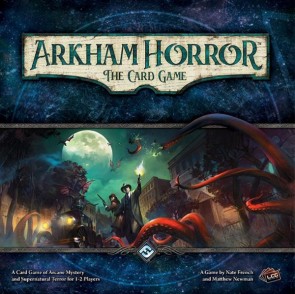You'd have thought there was only so much Lovecraft that gamers could stomach. Yet, year after, year release schedules continue to put a lie to that presumption. Arkham Horror: The Card Game, though, promises to be different. At night, in dreams, eldritch horrors whispered in my ear that it was new and exciting. At dawn, zombie-like, I staggered out under their baleful influence to secure and play a copy.
It promises to be a Living Card Game, and it both is and isn't. You do build a deck from the selection of cards in the box. At first, it's wise to go with the suggested starter decks. But when you come to build them, you'll find there's not actually that many. In fact, you don't have enough to make more than two decks.
That's could be okay, though, because another way in which it differs from the standard LCG model is that it's solo or co-operative. So playing with no more than two is fine. And then there's the third key departure, which is the narrative element. To play, you choose and set-up a scenario. This includes two decks which track progress, one for the players and one for the monsters. The turn over at different rates, although safe is say that if the monsters progress runs much ahead of player progress, you're heading for a loss.
Yet that could also be okay, though, because of the novel and smart adventure-like structure. The game comes with a little booklet of paragraphs, a bit like a choose your own adventure. Except that instead of picking paragraph numbers, you're directed to them by combinations of the progress cards. The different order in which these come out can lead to different narrative outcomes. There are various end paragraphs, of various level of success. So it's possible to do badly and still complete the scenario and carry one. Adventures, you see, link together into campaigns.
So, a poor result in your first scenario carries through to the next. This allows you the chance to pull some value from the ashes, albeit with a millstone around your neck. It also means that there's a lot of story based variety in the game. Between the different plays you can make, the different progressions you can see and the different ways a campaign can unfold, you'll never see the same game twice. I had reservations about the limited number of scenarios in the box, but they proved unfounded: there's plenty of stories in the base game alone.
Speaking of the plays you make, there's plenty of smart and novel design here, too. You build a map from location cards and move round it by taking actions, including drawing and playing cards. Instead of a dice there's the comical sounding "chaos bag" which contains a mix of counters specified by the scenario. Most are simple bonus or penalty values, but there are a few more specific effects which again depend on the scenario. Like the rest of scenario setup, building the bag is a pain. But the results are worthwhile: a careful tailoring of difficulty, a stitch of narrative and a thread of probabilities for players to ponder.
Better, though is the simple mechanic that the bag builds on to determine success in completing tasks. To succeed, you need to beat a difficulty. This is normally a specified stat like combat or willpower, modified by a token from the bag. Before you draw, though, you can discard cards to get a bonus. This, then, is the slavering squid beak with which the game ensnares you. How much do you really need to pass that test? Enough to throw away half your hand when you might need it for the next challenge? No? How about a quarter then? An eighth? Your soul?
Of course, it's gambling disguised inside a grand narrative structure. But what a structure, and what addictive gambling! By the time the ghouls have dragged your starting investigators down into their hideous burrows, you'll want to try again. And again. And then, win or lose, you're going to start tinkering with your decks. At which point, all that careful stitching begins to unpick a bit.
You might imagine this comes down to the limited number of cards in the box, and that's certainly a factor. You can only put two copies of a given card in your deck, and the base game comes with just one copy of some useful ones. For many others there aren't enough to make multiple decks which is why you can only have two players at once. Fine, the cards are cheap. Buy another copy of the core set. Better yet, buy one or more of the expansions. I had the Dunwich Legacy to play with, too, which as well as expanding your options starts another fun campaign.
Yet even with more cards at your disposal, deck building still falls flat. At first, I thought it was the sheer administrative overhead. You're just juggling lots of confusing cards until you get familiar with the mix. Even when you do, you can improve certain cards between games by literally removing them from the deck and replacing them with better copies. It's a solid way to represent experience and character advancement, but it's in practice, it's a pain. You need to find right cards and swap them round, ensuring at all time that you're using the right level of card in your deck.
In the final reckoning though, the enemy wasn't the Cthulhu mythos itself: it was me. In the first sense, as a co-operative game you're playing against yourself, so the game rewards the amount of effort you put into it. In the second sense, I just didn't find that motivating enough to want to build decks. In a competitive LCG you're in an arms race, always trying to get one-up on the inventions of the people you're playing against. Here, you're just one-upping yourself. It's not enough to maintain interest, given the overhead of learning the card mix and maintaining your deck.
A mixed bag, then, for the game with the chaos bag. Actually playing the game is brilliant. All the stuff you need to do to actually play the game is not. If you're motivated than me by the prospect of self-improvement, you will likely find this game far, far more engaging than I did. Personally, I'm going to vegetate here on the sofa until the Great Old Ones awaken.
 Games
Games How to resolve AdBlock issue?
How to resolve AdBlock issue? 























